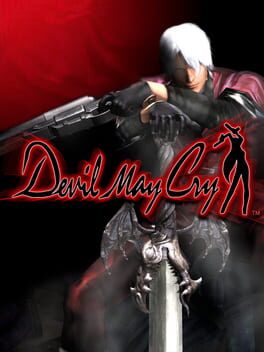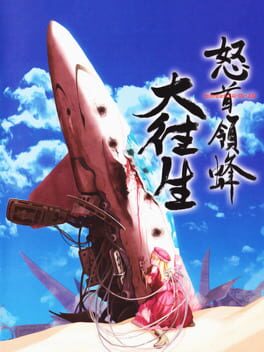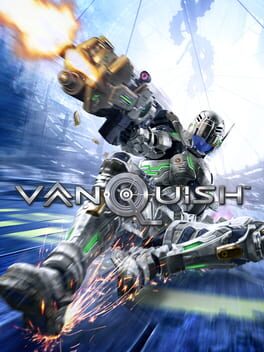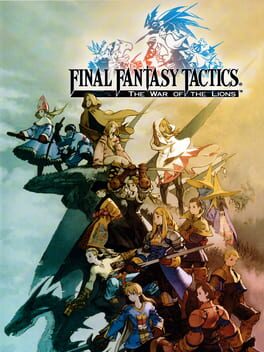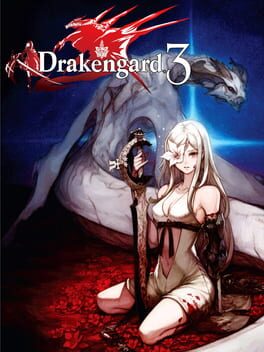wdyt
Bio
5/5 means I'm the target-audience.
4/5 means I think the game is great.
3/5 means I think the game is good.
2/5 means the game was or is good enough for me to stomach a playthrough of it.
1/5 means I am not the target-audience.
I'm always on the lookout for something new. Feel free to recommend something you think I might like.
5/5 means I'm the target-audience.
4/5 means I think the game is great.
3/5 means I think the game is good.
2/5 means the game was or is good enough for me to stomach a playthrough of it.
1/5 means I am not the target-audience.
I'm always on the lookout for something new. Feel free to recommend something you think I might like.
Badges

Best Friends
Become mutual friends with at least 3 others

1 Years of Service
Being part of the Backloggd community for 1 year

Listed
Created 10+ public lists

Organized
Created a list folder with 5+ lists

GOTY '23
Participated in the 2023 Game of the Year Event

Popular
Gained 15+ followers

Loved
Gained 100+ total review likes

Well Written
Gained 10+ likes on a single review

Noticed
Gained 3+ followers

Gone Gold
Received 5+ likes on a review while featured on the front page

Liked
Gained 10+ total review likes

Elite Gamer
Played 500+ games

Gamer
Played 250+ games

N00b
Played 100+ games
Favorite Games
763
Total Games Played
000
Played in 2024
044
Games Backloggd
Recently Reviewed See More
This is a strange RPG. Literally all successful actions result in accrual of EXP and JP. This means, you can get everything you want from a job for all the characters in your party in a single fight as well as adjust their Brave and Faith the maximum permanent amount in a single fight as well. You can, equipment and unique characters aside, build your endgame party in the first room in the game after a few fights. This would require knowledge of the jobs and their abilities first so you can focus said grinding, but it's there as a seemingly available option not requiring exploits. I'm not sure when the best time to do this grinding would be. You will not naturally obtain the game's most powerful classes and abilities without grinding, and there's nothing stopping you from grinding when you hit a wall (unless you overwrite your only save in a campaign or something). On my last run, I did make my endgame party early, but I can't say that was the best way to play it or that it was fun. Putting the crew together honestly isn't any fun at all. The opposite extreme of not knowing how to form your party and getting stuck on a fight because all your guys suck is also pretty bad.
This update adds new classes, new equipment, and a couple of multiplayer modes. It's the most content-rich version. I'd suggest either emulating it or getting the patch to deal with the slowdown.
I'm kind of confused about my feelings about the game as it comes across to me as strangely sandboxy despite its genre. You really are free to mold your party as you see fit without only gentle suggestions either way (female units tend to perform better with magic and male units tend to perform better with physical combat, the protagonist scales equally at both). This highly experimental approach to party-forming did hold my attention across several playthroughs, but, knowing how the systems work, I have no desire to play it again.
I'm torn on picking an overall rating for how it plays. It's definitely not fun when you know what you're doing, but I'll instead review it as a large puzzle you'll unravel that's perhaps overly cryptic. That would at least mean it was interesting for the initial run. 2.5/5
This update adds new classes, new equipment, and a couple of multiplayer modes. It's the most content-rich version. I'd suggest either emulating it or getting the patch to deal with the slowdown.
I'm kind of confused about my feelings about the game as it comes across to me as strangely sandboxy despite its genre. You really are free to mold your party as you see fit without only gentle suggestions either way (female units tend to perform better with magic and male units tend to perform better with physical combat, the protagonist scales equally at both). This highly experimental approach to party-forming did hold my attention across several playthroughs, but, knowing how the systems work, I have no desire to play it again.
I'm torn on picking an overall rating for how it plays. It's definitely not fun when you know what you're doing, but I'll instead review it as a large puzzle you'll unravel that's perhaps overly cryptic. That would at least mean it was interesting for the initial run. 2.5/5
Played on RPCS3 at 4k 60fps, so no performance issues on my end.
The gameplay's better than Drakengard 1, for sure. The lock-on is more competent, but because of the increased size and movement of enemies, and the way they're mixed and match, you'll probably have a harder time seeing. There's also a perfect-block thrown in, and certain encounters basically force it to be mandatory. Bosses won't sit still for your combos without doing one, and it instantly puts an end to the ridiculous poise and defense-buffs possessed enemies get. Normal combat escalates quite a bit in difficulty. The side-missions unlocked in branch D all but necessitate the infinite blood outfit (which in turn gives you infinite use of the game's powered up mode which speeds you up, slows everyone down, and increases your attack quite a bit).
The weapon system returns, but getting them is quite easy this time. Instead of having to hit arbitrary and cryptic sub-mission goals, they're in chests lying around at all times, given for side-missions, or bought in the store. Upgrading them is a monstrous chore though. Instead of it just being based on kill count, it requires an unnaturally high amount of gold. You will be grinding for a long time if you want this done.
Dragon combat, I'd say, is a downgrade. Instead of the flight-simish combat of Drakengard 1, you're either in basic rail-shooter stages or in simplistic faux-action combat with a generous lock-on.
The story, once again for a Taro game, reveals itself as secretly interesting if you can stick it out. The first branch was rather miserable to me as it was just antisocial anime-dialogue getting spewed by a bunch of stupid people for hours. It made me appreciate the dull medieval fantasy storytelling of the first game in hindsight. Eventually, you find out a weird robot can manifest hypothetical branches where things turn out differently, and this robot basically trial-and-errors you into branch D so you can actually succeed with your goal. This kinda meta-storytelling renders every ending equally valid in a way other "open to interpretation" stories don't by highlighting the divergences so literally.
I did want to go over the rhythm section that closes off Branch D. It's weird to compare it to the similar section that ended Drakengard 1. It's "easier" as far as the patterns go, but it's grueling as far as its length and timing those inputs. I thought it was pretty fun, but I like rhythm games a lot. YMMV
I don't think it gets interesting enough to justify the curious, but there are certainly worse B-games to play through.
2/5
The gameplay's better than Drakengard 1, for sure. The lock-on is more competent, but because of the increased size and movement of enemies, and the way they're mixed and match, you'll probably have a harder time seeing. There's also a perfect-block thrown in, and certain encounters basically force it to be mandatory. Bosses won't sit still for your combos without doing one, and it instantly puts an end to the ridiculous poise and defense-buffs possessed enemies get. Normal combat escalates quite a bit in difficulty. The side-missions unlocked in branch D all but necessitate the infinite blood outfit (which in turn gives you infinite use of the game's powered up mode which speeds you up, slows everyone down, and increases your attack quite a bit).
The weapon system returns, but getting them is quite easy this time. Instead of having to hit arbitrary and cryptic sub-mission goals, they're in chests lying around at all times, given for side-missions, or bought in the store. Upgrading them is a monstrous chore though. Instead of it just being based on kill count, it requires an unnaturally high amount of gold. You will be grinding for a long time if you want this done.
Dragon combat, I'd say, is a downgrade. Instead of the flight-simish combat of Drakengard 1, you're either in basic rail-shooter stages or in simplistic faux-action combat with a generous lock-on.
The story, once again for a Taro game, reveals itself as secretly interesting if you can stick it out. The first branch was rather miserable to me as it was just antisocial anime-dialogue getting spewed by a bunch of stupid people for hours. It made me appreciate the dull medieval fantasy storytelling of the first game in hindsight. Eventually, you find out a weird robot can manifest hypothetical branches where things turn out differently, and this robot basically trial-and-errors you into branch D so you can actually succeed with your goal. This kinda meta-storytelling renders every ending equally valid in a way other "open to interpretation" stories don't by highlighting the divergences so literally.
I did want to go over the rhythm section that closes off Branch D. It's weird to compare it to the similar section that ended Drakengard 1. It's "easier" as far as the patterns go, but it's grueling as far as its length and timing those inputs. I thought it was pretty fun, but I like rhythm games a lot. YMMV
I don't think it gets interesting enough to justify the curious, but there are certainly worse B-games to play through.
2/5
Of the big 3 Nintendo IPs, along with Zelda and Mario, I've always found Metroid the least interesting. The games aren't bad, I just think they're less strong comparably when it comes to platforming and combat. This observation isn't addressed here in the third game in the series.
It might seem strange to make that claim when you see the scenario variety, but the complexity of the platforming peaks early on when you don't have any upgrades. The later scenarios, like running through a room with a speed booster or using the grappling hook, are just employments of an upgrade. Nothing mechanically interesting is happening. Same with weapons, you just get stronger pew-pews.
What the game actually does well is its map, and, in this way, it's probably the strongest game in the entire series. The genre this game falls in is described pretty firmly as being about constant backtracking to put new upgrades to use. I'd argue Super Metroid is a linear game cleverly disguised as one with exploration. The path forward doesn't stop. The end of each area dumps at the start of the next. It's an ingenious map, and you can rest assured that even if you don't know exactly where to go at the end of an area you are still in the starting point of the next one. Exploration tends to be short detours for a small optional upgrade instead of a means to progression.
It's not the best jump-and-shoot game, but it is a great one. 4/5
It might seem strange to make that claim when you see the scenario variety, but the complexity of the platforming peaks early on when you don't have any upgrades. The later scenarios, like running through a room with a speed booster or using the grappling hook, are just employments of an upgrade. Nothing mechanically interesting is happening. Same with weapons, you just get stronger pew-pews.
What the game actually does well is its map, and, in this way, it's probably the strongest game in the entire series. The genre this game falls in is described pretty firmly as being about constant backtracking to put new upgrades to use. I'd argue Super Metroid is a linear game cleverly disguised as one with exploration. The path forward doesn't stop. The end of each area dumps at the start of the next. It's an ingenious map, and you can rest assured that even if you don't know exactly where to go at the end of an area you are still in the starting point of the next one. Exploration tends to be short detours for a small optional upgrade instead of a means to progression.
It's not the best jump-and-shoot game, but it is a great one. 4/5
